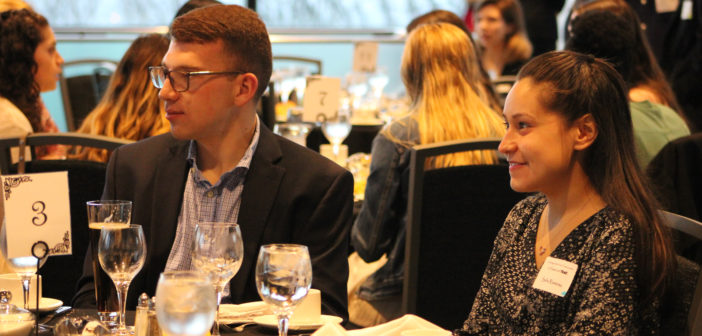The TRAC Writing Fellows Program celebrated a decade of success and growth at its 10-year anniversary celebration in Iacocca Hall on April 28.
Though the program started with only 15 TRAC fellows, it now boasts more than 70. The program is part of an initiative called Writing Across the Curriculum that began at Lehigh in fall 2008.
“Writing Across the Curriculum requires a culture change where student voices are valued, promoted and celebrated,” said Greg Skutches, the director of the initiative. “So I thought a writing fellows program would be key to my success.”
Peer writing tutors are undergraduate students from various disciplines who are assigned specific courses and students each semester. Skutches said the tutors are invested in their students’ improvement and progress.
“We want to help first-year students (build) habit(s) and learn with TRAC fellows,” Skutches said, “getting drafts done early, getting feedback and talking with a peer.”
Through this process, he hopes to provide first-year students with strong writing foundations from which they can benefit in the future.
TRAC fellows are required to take a rigorous, four-credit seminar course to prepare for their positions.
Kiran Singh, ’18, a mentor fellow in the program, said she enjoyed her experience in the seminar course.
“The TRAC community is a family, and you get really close with the people you share the seminar with because you are encouraged to be so open and vulnerable in the conversations we’re having,” she said.
One of her favorite parts of the seminar was mindfulness meditation, when students would meditate for about three minutes before the start of each class.
“It’s life-changing for me,” Singh said. “It centers you and allows you to be present.”
Singh said she joined the TRAC program because she finds some students lack passion because of the institutionalized writing process. She said everyone in the TRAC program is passionate about helping others develop a love for writing.
Omar Ahmed, ’19, a TRAC fellow for Organic Chemistry II, said the program aims to improve students’ communication skills.
“It’s not (about) getting a better grade for someone on their paper,” Ahmed said. “We want to help people become better communicators… We want to give students the tools so that in the future they can be able to communicate effectively and criticize their own work.”
During the seminar, TRAC fellows complete research projects about how the program can be improved.
Ahmed explained how the TRAC program expanded to video with the One Button Studio in the E.W. Fairchild-Martindale Library. Organic Chemistry II students, for example, use the studio to create videos to help themselves and other students learn the course material.
Ahmed said students can solve problems on a board in the One Button Studio to create resources similar to Khan Academy videos.
“We’re there to make sure the videos are clear and concise so whoever watches it later can understand,” Ahmed said. “A lot of people look at the TRAC program as another type of writing center. It’s sad because we’re the only people who know that’s not true.”
He hopes the TRAC program will continue to expand beyond writing.
“I hope that with this multimodal push that in the future will make the connotation fade away, and that people will start to see the true program in a sense,” Ahmed said.






Comment policy
Comments posted to The Brown and White website are reviewed by a moderator before being approved. Incendiary speech or harassing language, including comments targeted at individuals, may be deemed unacceptable and not published. Spam and other soliciting will also be declined.
The Brown and White also reserves the right to not publish entirely anonymous comments.